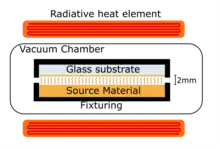Closed space sublimation is a method of producing thin-films, esp. cadmium telluride photovoltaics, though it is used for other materials like antimony triselenide.[1]

It is a type of physical vapor deposition where the substrate to be coated and the source material are held close to one another. They are both placed in a vacuum chamber, which is pumped down. The source and substrate are then heated. The source is heated to some fraction of its melting temperature, and the substrate some lower temperature e.g. 640 °C and 600 °C, respectively.[2] This causes sublimation of the source, allowing vapors to travel a short distance to the substrate, where they condense, producing a thin film. This short-path diffusion is similar in principle to short-path distillation. Compared to other techniques, it is a relevantly insensitive process, and takes as little as 15 minutes for an entire cycle.[3] This makes it a very viable technique for large-scale manufacturing.[4]
References
- ↑ Birkett, Max; Linhart, Wojciech; Stoner, Jessica; Phillips, Laurie (24 May 2018). "Band gap temperature-dependence of close-space sublimation grown Sb2Se3 by photo-reflectance". APL Materials. 6 (8): 084901. Bibcode:2018APLM....6h4901B. doi:10.1063/1.5027157.
- ↑ Guogen Liu; Zimeng Cheng; Georgiou, George E.; Chin, Ken K. (June 2015). "The growth model of CdTe thin film by close spaced sublimation". 2015 IEEE 42nd Photovoltaic Specialist Conference (PVSC). IEEE. pp. 1–5. doi:10.1109/pvsc.2015.7355909. ISBN 978-1-4799-7944-8. S2CID 31360926.
- ↑ Bothwell, Alexandra M.; Drayton, Jennifer A.; Jundt, Pascal M.; Sites, James R. (2020-03-06). "Close-Space Sublimation-Deposited Ultra-Thin CdSeTe/CdTe Solar Cells for Enhanced Short-Circuit Current Density and Photoluminescence". Journal of Visualized Experiments (157): e60937. doi:10.3791/60937. ISSN 1940-087X. OSTI 1721473. PMID 32202534. S2CID 214617834.
- ↑ Potamialis, C.; Lisco, F. "Fabrication of CdTe Thin Films by Close Space Sublimation" (PDF). Centre for Doctoral Training New and Sustainable Photovolatics. Centre for Renewable Energy Systems Technology (CREST), Wolfson School, Loughborough University. Retrieved 26 April 2019.